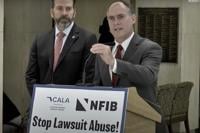
U.S. District Judge Kathleen Williams
“Alligator Alcatraz,” the new immigrant-detention facility in the Everglades, must halt expansion plans and shut down operations within 60 days to avert environmental harm to the surrounding wetlands, a federal judge said.
The Aug. 21 opinion by Judge Kathleen Williams was a win for the environmental groups that filed the lawsuit challenging the facility. Plaintiffs Friends of the Everglades and the Center for Biological Diversity argued that the construction of the detention facility at the Dade-Collier Training and Transition Airport in the Big Cypress region in South Florida without any environmental review violated the National Environmental Policy Act and could harm threatened or endangered wildlife such as the wood stork, Florida bonneted bat and the Florida panther.
Gov. Ron DeSantis, however, said the detention facility was an effort to help the Trump administration to enforce immigration laws and added that he would not be deterred by “an activist judge” trying to enact policy from the bench.
“We got news last night that we had a judge try to upset the apple cart with respect to our deportation and detainee-processing center down in South Florida at Alligator Alcatraz,” DeSantis said last week at a press conference. “I just wanted to say this was not something that was unexpected. This was a judge who was not going to give us a fair shake.”
The governor’s communications director, Alex Lanfranconi, also seemed unconcerned with the judge’s decision.
“The deportations will continue until morale improves,” Lanfranconi said in a statement that was emailed to the Florida Record.
Friends of the Everglades indicated that an appeal of Williams’ 82-page decision has already been filed and that detention center supporters have “deep pockets” and no intention to back off. In fact, DeSantis said last week that another immigration facility, an “deportation depot,” would be in operation outside of Jackson.
Supporters of Friends of the Everglades have anted up $200,000 for future legal battles over the detention center, which started construction after the Florida Division of Emergency Management gained control of the site in June. The center now includes enough residential facilities to hold thousands of detainees in addition to the center’s staff, and it includes 20 acres of land.
Defendants in the lawsuit include Kristi Noem, U.S. secretary of homeland security, and Kevin Guthrie, executive director for the Florida Division of Emergency Management.
Williams said the center’s existence was the result of major federal actions that significantly affected the environment in a region that has drawn the attention of generations of conservationists. Runoff pollution from the center could affect the drinking water of nearby communities and the Miccosukee Tribe, which joined the lawsuit, according to the opinion.
“... The defendants cannot put the cart before the horse – they cannot construct a facility and, then in response to litigation such as the instant case, decide to fulfill their legal obligations,” she said in the opinion.
Williams’ order includes a preliminary injunction barring state and federal defendants and their agents from installing additional industrial lighting, paving, excavating, installing more fencing or engaging in any site expansion. The order also prevents additional personnel or detainees from being brought to the site.
In 60 days, the defendants have to remove all temporary fencing to give tribe members access to the area, dismantle lighting fixtures required for the purpose of securing detainees and pull out all the generators, sewage systems and waste receptacles installed during the center’s construction, the order says.
“This ruling affirms what we argued in court – that the government can’t just build something in the middle of the Everglades and the Big Cypress preserve with no environmental review, and no public input,” Tania Galloni, one of the attorneys representing the plaintiffs, said in a prepared statement. “This is why we have environmental laws – to protect the wetlands and ecosystems we all depend on from illegal development.”






